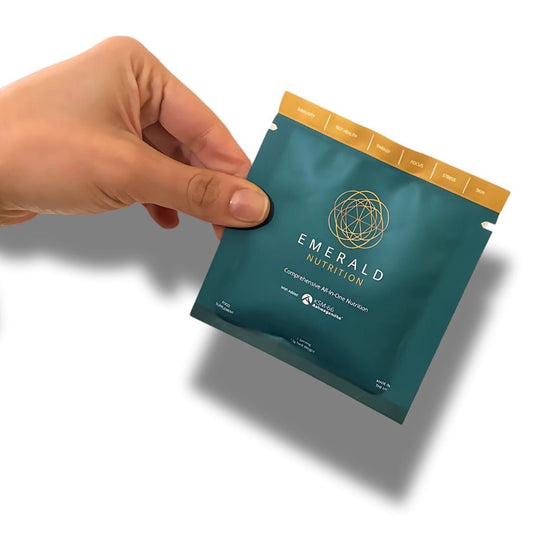
Synbiotics Unveiled: The link between the Gut, Brain and Overall Health
Julia BloszykShare
What are Synbiotics, and how do they support gut health
Discover Synbiotics - the last out of the 3 main health pillars of Emerald Nutrition
3. Synbiotics
Our gut is responsible for more than just digestion of food. It has a direct link with the brain and rest of the body, affecting our mood, general health and cognition.
Irregular bowel movements, bloating, gassiness, constipation, diarrhea - these are the main symptoms of Irritable Bowel Syndrome (IBS) and can suggest dysbiosis – meaning our gut microbiome is out of balance. IBS affects every 1 in 5 adults in the UK, and is one of the main causes for GP appointments. The symptoms, whether mild or severe, bring a lot of discomfort and can get in a way of everyday life.
Luckily, they can be controlled and avoided through paying attention to what we eat and aided by use of dietary supplements.
But with so many different gut health supplements, we often wonder which one should I go with? Which one is the best? Will all of them work the same?
There are three main types of gut health supplements:

1. Probiotics – friendly bacteria strains
Probiotics in other words are strains of friendly bacteria. These can be naturally found in certain foods, including fermented foods like sourdough, kefir, sauerkraut, kombucha, kimchi, or taken as a supplement. They help to provide a healthy balance of gut microbiota, fight harmful bacteria, help digestion and even improve immune function.
Unfortunately, many probiotic supplements cannot survive the acidic environment of the stomach and die off before reaching the gut. This is why Emerald Nutrition uses Bacillus Coagulans (ActiBio®) in it’s formula – a patented vegan friendly probiotic strain specifically designed to pass through the stomach to reach the gut.
2. Prebiotics – non-digestible fibres, which feed our microbiome
Prebiotics are non-digestible fibres which serve as a feed for our microbiome. They can change the composition of our gut microflora by stimulating the growth of beneficial bacteria strains.
Prebiotics can be found naturally in some foods, including garlic, onions, oats, leeks, wheat and soybeans. Although all prebiotics are fibre, not all fibre is prebiotic.

In Emerald Nutrition we use several prebiotic ingredients in our unique formulation. One such well-known prebiotic ingredient is Chicory Root (Inulin) - referred to as a ‘gold standard’ prebiotic. It’s been shown to help with digestion, relieve some bowel function disorders and gastrointestinal issues, like constipation, prevent the risk of gastrointestinal diseases and help with blood sugar and appetite regulation.
3. Fibres – responsible for regular bowel movements
The term ‘dietary fibre’ was formulated in the last century but the general knowledge on the benefits of increased fibre intake reaches back to 430 BC when Hippocrates observed and defined the laxative effect of coarse wheat, compared to refined wheat.
Dietary fibre can be divided into:
- Soluble fibre: found in fruits and oats
- Insoluble fibre: found in wheat bran and nuts
- Resistant starch: found in bananas, potatoes, grains and pulses.
The role of dietary fibre includes: alleviation of constipation, reduced inflammation and improved immune system.
The Emerald Nutrition formulation includes:
Plant fibres: apple, pineapple, flaxseed, baobab fruit fibre. In total providing 2.4g of fibre in a 12g serving (20%).
Digestive Enzymes
Digestive enzymes are proteins that help break down food into smaller parts so your body can easily use the nutrients.
Your stomach, small intestine and pancreas all make digestive enzymes. The pancreas is really the enzyme “powerhouse” of digestion. It produces the most important digestive enzymes, which are those that break down carbohydrates, proteins and fats.
For some individuals, the body may not produce enough digestive enzymes, or it may fail to release them properly. This can hinder the breakdown of certain foods and the absorption of essential nutrients, potentially leading to digestive discomfort or even malnutrition. Common symptoms of enzyme insufficiency include bloating, abdominal pain, diarrhea, and excess gas, all of which can disrupt daily life.
Digestive Enzymes Vs Probiotics .... what's the difference?
It’s also worth noting that digestive enzymes are often confused with probiotics, though the two play very different roles in digestion. Probiotics are live microorganisms that contribute to the population of beneficial bacteria in your gut. They support overall gut health and indirectly aid digestion by creating an environment in which enzymes can function optimally. However, unlike digestive enzymes, probiotics themselves cannot break down or digest food. Instead, they work in tandem with enzymes to keep your digestive system running smoothly.
With that in mind, Emerald Nutrition's formulation includes the well known Digezyme® blend - a specially designed mix of digestive enzymes to further enhance digestion.
Synbiotics
Sometimes we come across the word ‘synbiotic’ – describing the synergy between clinically studied pre- and pro- biotics.
This 2-in-1 formula works together to help in cultivating the right environment in our gut, as well as promoting good digestion & assimilation of micro and macro nutrients. Instead of taking 2 separate supplements and stacking up your cupboards - you get them together.
In Emerald Nutrition we care about simplicity of our daily routine while putting our health first. This is why our formula contains clinically studied pre- and pro- biotics, supported by dietary fibres and digestive enzymes - to provide you with the full spectrum of health benefits in just one scoop.








